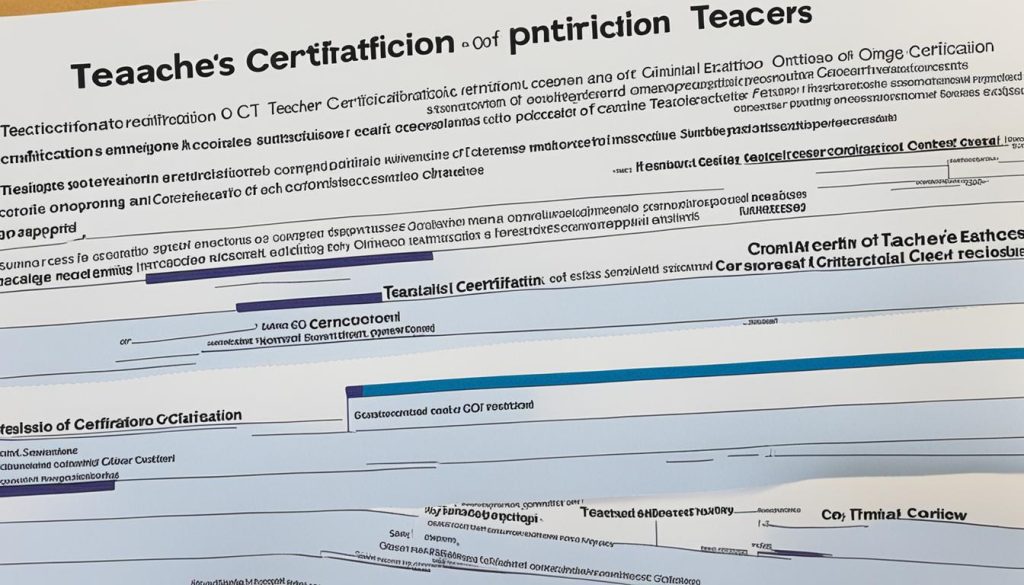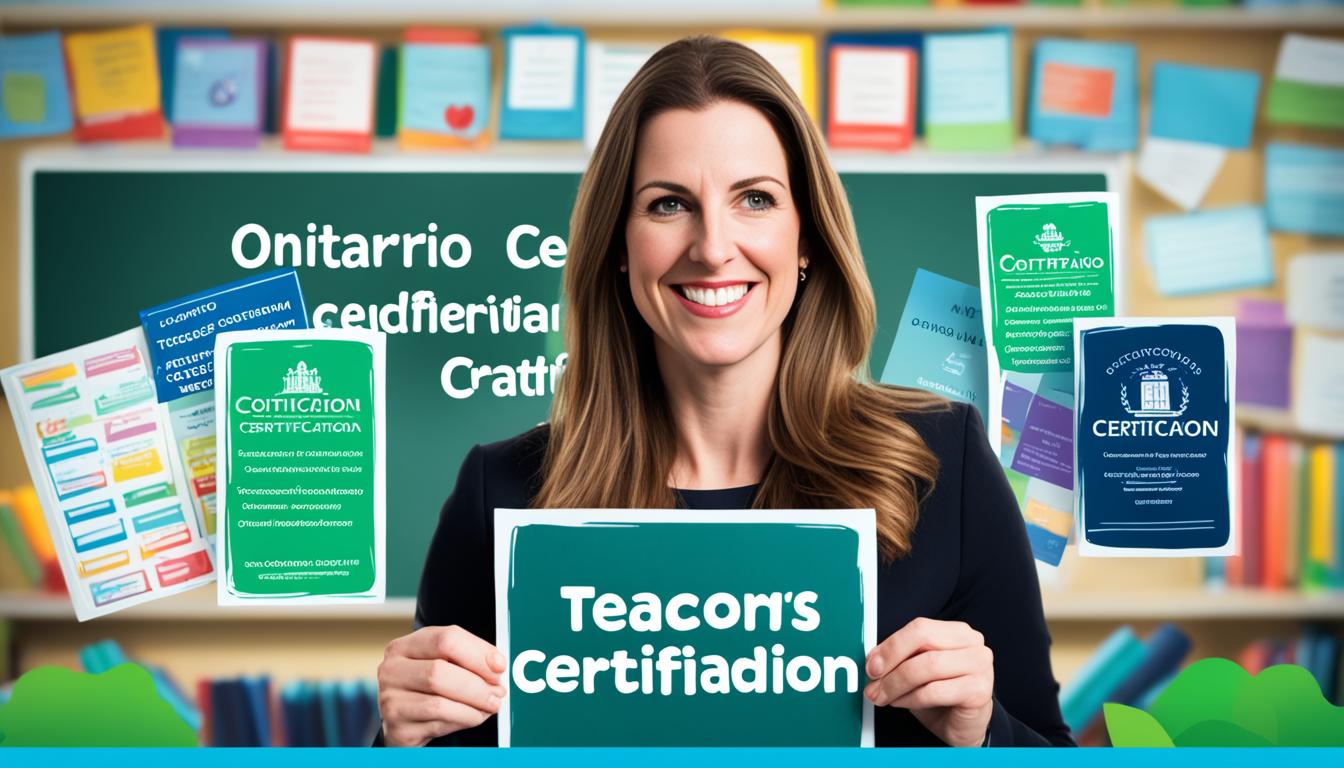If you’re passionate about education and making a difference in the lives of young people, pursuing a career as a teacher in Ontario might be the perfect fit for you. Ontario is known for its high-quality education system, and becoming a certified teacher in the province opens up a world of opportunities. However, like any profession, there are certain requirements and steps that aspiring educators need to complete in order to obtain their teaching license. In this article, we will guide you through the process of how to become a teacher in Ontario, highlighting the necessary qualifications, the application process, and the steps you need to take to kick-start your teaching career.
Whether you’re a recent graduate or a seasoned professional looking for a career change, this guide will provide you with valuable information to help you navigate the journey toward becoming an Ontario-certified teacher. So, let’s dive in and explore the exciting path to becoming a teacher in Ontario!
Understanding Ontario Teacher Certification
To begin a rewarding teaching career in Ontario, understanding the comprehensive certification process is crucial. The Ontario teacher certification, governed by the Ontario College of Teachers, ensures that aspiring educators meet specific educational and professional standards to achieve their teaching license in Ontario.
1. Requirements for Certification
Prospective teachers must meet rigorous requirements to receive their Ontario teacher certification. An undergraduate degree is fundamental for general education teachers. For those pursuing technological education, a mix of certificates, diplomas, degrees, and relevant work experience is essential.
Completion of an initial teacher education program is mandatory, encompassing at least 30 credits and 40 practicum days. Practicum requirements include teaching under a Transitional Certificate of Qualification and Registration (TCQR) for up to 20 days. Teachers must also be qualified across at least two consecutive divisions, such as Primary (Grades K-3) and Junior (Grades 4-6).
2. Ontario College of Teachers
The Ontario College of Teachers is the regulatory authority overseeing teaching licenses in Ontario. Teachers must remain members in good standing, adhering to professional standards and ethical guidelines. The College issues the Certificate of Qualification and Registration, updated annually after membership fees are received.
Additional Qualifications (AQ), such as further education in methodology or administration, are recorded on the Certificate of Qualification and Registration and updated yearly. Various certificates, including the Multi-Session Transitional Certificate of Qualification and Registration (MTCQR), cater to different educational paths and timelines.
3. Annual Membership Fees
Certified teachers must pay annual fees to the Ontario College of Teachers to maintain their teaching license in Ontario. The College updates and mails the Certificate of Qualification and Registration upon fee reception. Teachers may also request an updated certificate anytime for a fee of $24.
Staying current with membership fees and professional standards is imperative for maintaining an active teaching certification in Ontario. Additionally, programs like the New Teacher Induction Program (NTIP) and Teacher Performance Appraisal System support continuous professional development and growth in the education sector.
Educational Requirements for Teachers
To embark on a teaching career in Ontario, one must closely adhere to several educational requirements. These standards ensure that teachers are well-prepared to provide high-quality education within the province’s diverse school systems.
1. Undergraduate Degree
One of the primary steps to becoming a teacher in Ontario is obtaining an undergraduate degree. An education degree for teachers in Ontario typically requires a post-secondary degree of at least three years in duration. This foundational degree is crucial as it underpins the advanced pedagogical training that follows.
2. Teacher Education Program
Following the undergraduate degree, prospective teachers must complete a teacher education program. Ontario mandates a four-semester Bachelor of Education (B.Ed) program, which includes a minimum of 80 days of practicum experience in classroom settings. These programs are designed to equip future educators with essential teaching methodologies, classroom management skills, and subject-specific knowledge.

3. Accepted Postsecondary Institutions
It is essential to enroll in accredited institutions recognized by the Ontario College of Teachers. These institutions provide validated programs that meet the province’s stringent educational standards. Some renowned faculties of education include:
- Brock University
- Ontario Tech University
- University of Toronto’s Ontario Institute for Studies in Education (OISE)
- Nipissing University
- Queen’s University
- University of Western Ontario
- Wilfrid Laurier University
Each of the listed institutions offers comprehensive Bachelor of Education programs approved by the Ontario College of Teachers, ensuring all graduates are fully prepared for the demands of teaching in Ontario.
| Institution | Location | Program Duration |
|---|---|---|
| Brock University | St. Catharines | 4 Semesters |
| Ontario Tech University | Oshawa | 4 Semesters |
| University of Toronto (OISE) | Toronto | 4 Semesters |
| Nipissing University | North Bay | 4 Semesters |
| Queen’s University | Kingston | 4 Semesters |
| University of Western Ontario | London | 4 Semesters |
| Wilfrid Laurier University | Waterloo | 4 Semesters |
How to Become a Teacher in Ontario?
Understanding how to become a teacher in Ontario involves navigating through several critical steps. Prospective teachers must acquaint themselves with the application process for Ontario teachers, language proficiency requirements, and mandated Sexual Abuse Prevention training.
1. Application Process
The application process for Ontario teachers entails rigorous steps. Initially, candidates must complete a post-secondary degree of at least three years, followed by a 4-semester Bachelor of Education program. To work in Ontario’s publicly funded schools, one must apply for certification from the Ontario College of Teachers (OCT). This includes paying a registration fee, submitting required documents, passing a Mathematics proficiency test, and completing Sexual Abuse Prevention training. Certification approval may take several months, and maintaining it requires an annual membership fee.

2. Language Proficiency
Language proficiency is a crucial criterion in Ontario. Teachers educated internationally or in another Canadian province must prove their proficiency in English or French. This sometimes involves taking an additional language proficiency test, especially if previous education was not in these languages. Documents in other languages need to be translated to be considered valid in the application process.
3. Sexual Abuse Prevention Program
A mandatory component for how to become a teacher in Ontario involves passing the Sexual Abuse Prevention Program. This training ensures that aspiring educators are informed and proactive in preventing and addressing any incidents of abuse. Keeping updated with the Ontario College of Teachers is essential, as requirements might change, necessitating regular reviews of official guidelines and attending information sessions for accurate and timely information.
Teacher Training Programs in Ontario
Understanding the landscape of teacher training programs Ontario is essential for aspiring educators. These programs are structured to ensure that teacher candidates meet the robust standards required by the Ontario College of Teachers.
1. Faculties of Education
Ontario boasts several esteemed Faculties of Education, including Brock University, Lakehead University, Queen’s University, and the University of Toronto. These institutions offer comprehensive teacher education programs that are accredited by the Ontario College of Teachers, ensuring that graduates are well-prepared to enter the classroom.
2. Teacher Education Application Service (TEAS)
Prospective teachers must apply to teacher education programs via the Teacher Education Application Service (TEAS). TEAS is a streamlined, centralized application service utilized by universities across the province. This service simplifies the application process, making it easy for candidates to apply to multiple programs at once.
Important deadlines to submit the Request to have a Faculty Report form for the Transitional Certificate of Qualification and Registration (TCQR) in 2024 are:
- July 17
- August 21
- September 18
- October 16
- November 20
- December 18 (this report will be sent early January due to office closure)
3. Specializations and Teaching Subjects
In Ontario, educators can specialize in various subjects and grades, from Kindergarten to Grade 12. To meet the requirements for these specializations, candidates must align their undergraduate credits accordingly. Teachers must possess certification in two of the four grade divisions: primary, junior, intermediate, and senior.
The table below provides a detailed breakdown of the divisions and the corresponding requirements:
| Grade Division | Certification Requirement |
|---|---|
| Primary (K-Grade 3) | No specific subject specialization required |
| Junior (Grades 4-6) | No specific subject specialization required |
| Intermediate (Grades 7-10) | Subject specialization needed, certain number of undergraduate credits |
| Senior (Grades 11-12) | Subject specialization needed, certain number of undergraduate credits |
In addition to general teacher education, teaching subjects certification Ontario can be pursued through additional qualifications programs offered in various formats, including one-session programs, three-session specialist programs, and honor specialist programs.
Finding Teaching Jobs in Ontario
Teaching jobs in Ontario can be found through various avenues, including publicly funded school boards, private schools, the provincial school authority, and demonstration schools. The province boasts 72 school boards, consisting of 60 English-language boards and 12 French-language boards, each offering a range of employment opportunities for qualified teachers.

The Ontario College of Teachers plays a pivotal role in guiding aspiring educators to locate teaching jobs in Ontario. They offer numerous resources and support systems to assist in the job search. Importantly, many private institutions also mandate that their educators are members of the College, ensuring adherence to quality teaching standards.
The Ontario College of Teachers emphasizes inclusivity and equal opportunity employment, in line with the Ontario Human Rights Code and the Accessibility for Ontarians with Disabilities Act. Additionally, they have adopted a flexible work environment, with a combination of remote and in-office workdays, reflecting a modern approach to work-life balance.
Teaching positions within Ontario offer competitive salaries. For instance, the average teacher salary in the province is approximately $96,398, positioning Ontario among the regions with higher teacher salaries in Canada. This incentivizes professionals to pursue teaching jobs in Ontario due to the attractive compensation packages.
Beyond salary incentives, the College has temporarily suspended its mandatory COVID-19 vaccination policy. However, this is subject to potential reactivation based on Public Health recommendations, demonstrating a responsive and adaptive approach to public health guidelines.
The Ontario Virtual School (OVS) is currently recruiting teachers for various subject areas, including Art, History, Chemistry, Biology, Physics, and Computer Science, among others. Candidates must hold OCT certification in Intermediate and Senior Divisions and possess experience teaching at the Secondary level. A strong understanding of the Ontario Secondary Curriculum and Growing Success is crucial for these roles, which are offered on a renewable one-year contract basis.
Moreover, private teaching opportunities also abound in Ontario, with many private schools requiring their teachers to be members of the Ontario College of Teachers. This ensures a standardized level of teaching quality and professional conduct.
| Job Position | Salary Range (CAD) | Job Type |
|---|---|---|
| Human Resources Generalist | $77,006 – $82,928 | Permanent |
| Decision Editor | $92,451 – $119,834 | Limited Term (up to 12 months) |
| Investigator and EDI Specialist | $84,316 – $100,274 | Permanent |
In conclusion, teaching jobs in Ontario provide substantial opportunities, from publicly funded schools to private institutions, each offering competitive salaries and a supportive working environment. The role of the Ontario College of Teachers remains integral in maintaining high educational standards and providing resources to both current and prospective educators in their employment pursuits.
Professional Development and Additional Qualifications
In Ontario, ongoing professional development is crucial for teachers aiming to expand their expertise, achieve career growth and meet the dynamic needs of education. Teachers holding an Ontario teaching certificate can enrol in various in-service professional development programs that lead to additional qualifications.
1. In-Service Programs
Professional development for Ontario teachers often involves participation in in-service programs offered by faculties of education and other organizations. These programs provide opportunities to gain additional teaching qualifications Ontario and include one-session courses, specialized training, and honour specialist programs. By engaging in these programs, educators can enhance their teaching skills and stay current with educational best practices.

2. Specialist Programs
To further their careers, Ontario teachers can take three Additional Qualification (AQ) courses to become subject-area Specialists. These Specialist programs are designed to deepen teachers’ knowledge in particular areas, making them more effective educators. Upon completion of specialist programs, teachers are not only better equipped to deliver high-quality education but also stand to gain significant wage enhancements. Additionally, they become prime candidates for leadership positions such as Division Coordinator, Vice Principal, and Principal. For those with aspirations to move even higher, completing specialist AQs can lead to roles like Superintendent or School Board Director.
| Program | Duration | Fees |
|---|---|---|
| EDUC16237 Teacher Leadership 1 | 5 weeks | $675 |
| Additional Basic Qualification (ABQ) | 7 weeks | $725 |
| Rebate for Ontario Tech U Alumni* | One-time | -$100 |
3. Ongoing Education
Ongoing education is essential to maintain teaching standards and continue career development. Ontario’s education system offers a broad spectrum of courses throughout the year to ensure teachers are always on the cutting edge of educational innovation. The Fall 2024 schedule includes courses such as Integration and Computer Technology in the Classroom Part 1, Mathematics, Primary and Junior Part 1 & Part 2, Philosophy Senior ABQ, Religious Education Part 1, and Science General Intermediate ABQ. These courses not only foster continuous professional development for Ontario teachers but also ensure they remain motivated and effective in their roles.
Pathway for Internationally Educated Teachers
For internationally educated teachers Ontario, navigating the path to certification involves multiple steps. To become certified, internationally educated teachers must first meet language proficiency requirements, typically an IELTS score of 6.5 Academic Overall or holding a Bachelor’s degree taught in English. Moreover, credential evaluations are essential to ensure equivalency with Ontario standards.
The process begins with a conditional offer letter, which can be received within 5 business days, allowing those educators to embark on their 18-month Ontario Teaching Preparation Program. This program, priced at $16,000, provides full-time work placement within schools, providing invaluable practical experience. Organizations like the Ontario College of Teachers (OCT) offer information sessions to guide these teachers through the certification process, thereby ensuring they meet the province’s educational standards.
Labour market trends from 2010 and beyond indicate changing demographics and declining enrollment, affecting the demand for teachers in Ontario (Chapter 3.2). Despite a surplus of teachers in 2010, certain subjects remain in high demand, such as math and science (Chapter 3.4). Geographical preferences also play a significant role, with opportunities more abundant in rural and northern communities (Chapter 4.1).
The pathway for internationally educated teachers Ontario includes the opportunity to apply for faculties of education to further enhance their qualifications. Universities like Brock University, Lakehead University, and Queen’s University offer Bachelor of Education programs that cater to these needs. Applications to these institutions utilize the Teacher Education Application Service (TEAS), a centralized application system streamlining the admission process.
| Requirement | Details |
|---|---|
| Tuition Fee | $16,000 |
| Program Duration | 18 months |
| Language Proficiency | IELTS of 6.5 Academic Overall |
| Conditional Offer | Received within 5 business days |
| Visa Approval | High approval rates, with potential tuition refund if rejected |
| Part-time Work Allowance | Up to 20 hours per week |
| Location | NEMC’s campus in North York, Ontario |
Conclusion
Pursuing a teaching career in Ontario involves a series of well-defined steps aimed at ensuring quality education. Prior to 1847, no training or certification was required to teach in Ontario, but significant strides have been made since then. Today, obtaining certification through the Ontario College of Teachers is a key requirement to become a teacher in Ontario. This process involves meeting specific educational qualifications and successfully navigating through the teacher education program offered by recognized institutions.
Understanding the historical context highlights the evolution of teacher education in the province. From 1853, when Ryerson introduced province-wide certification, to the establishment of multiple normal schools by 1920, Ontario has continuously adapted to the growing demand for qualified educators. This historical commitment reflects in the current efforts to address teacher shortages, as identified in the 2022 Transition to Teaching survey. Despite the challenges, Ontario remains a supportive environment with various programs tailored for both local and internationally trained professionals.
Engaging in ongoing professional development is essential for a teaching career in Ontario. With resources and specialist programs available, teachers are encouraged to further their skills continuously. The integration of modern regulatory changes, such as the revocation of Regulation 274/12, aims at simplifying the certification process. As you embark on this rewarding path, remember that your role greatly impacts students and the community, propelling Ontario’s education system towards excellence.
FAQ
1. How can I become a teacher in Ontario?
To become a teacher in Ontario, you need to be certified by the Ontario College of Teachers. This typically involves obtaining an undergraduate degree, completing a four-semester teacher education program, and applying for certification. Additionally, you must complete a sexual abuse prevention program and pay annual membership fees to maintain your certification.
2. What are the requirements for obtaining teacher certification in Ontario?
The requirements include having a minimum three-year postsecondary degree from an acceptable institution, completing a four-semester teacher education program, demonstrating proficiency in English or French, and completing a sexual abuse prevention program. You must also submit your credentials to the Ontario College of Teachers and pay annual membership fees.
3. Who regulates teacher certification in Ontario?
The Ontario College of Teachers is the regulatory body that certifies teachers to work in publicly funded schools in Ontario.
4. What are the annual membership fees for certified teachers in Ontario?
Certified teachers in Ontario must pay annual membership fees to maintain their certification. These fees support the regulatory functions of the Ontario College of Teachers and ensure adherence to professional standards.
5. What educational qualifications are needed to teach in Ontario?
You typically need an undergraduate degree for general education roles. For technological education roles, a combination of certificates, diplomas, or degrees along with relevant work experience may be accepted.
6. Which institutions offer accepted teacher education programs in Ontario?
Accepted institutions include universities such as Brock University and the University of Toronto’s Ontario Institute for Studies in Education, among others.
7. What is the Teacher Education Application Service (TEAS)?
TEAS is a centralized application service that streamlines the admission process for teacher education programs in Ontario, allowing prospective teachers to apply to multiple faculties of education using a single application.




